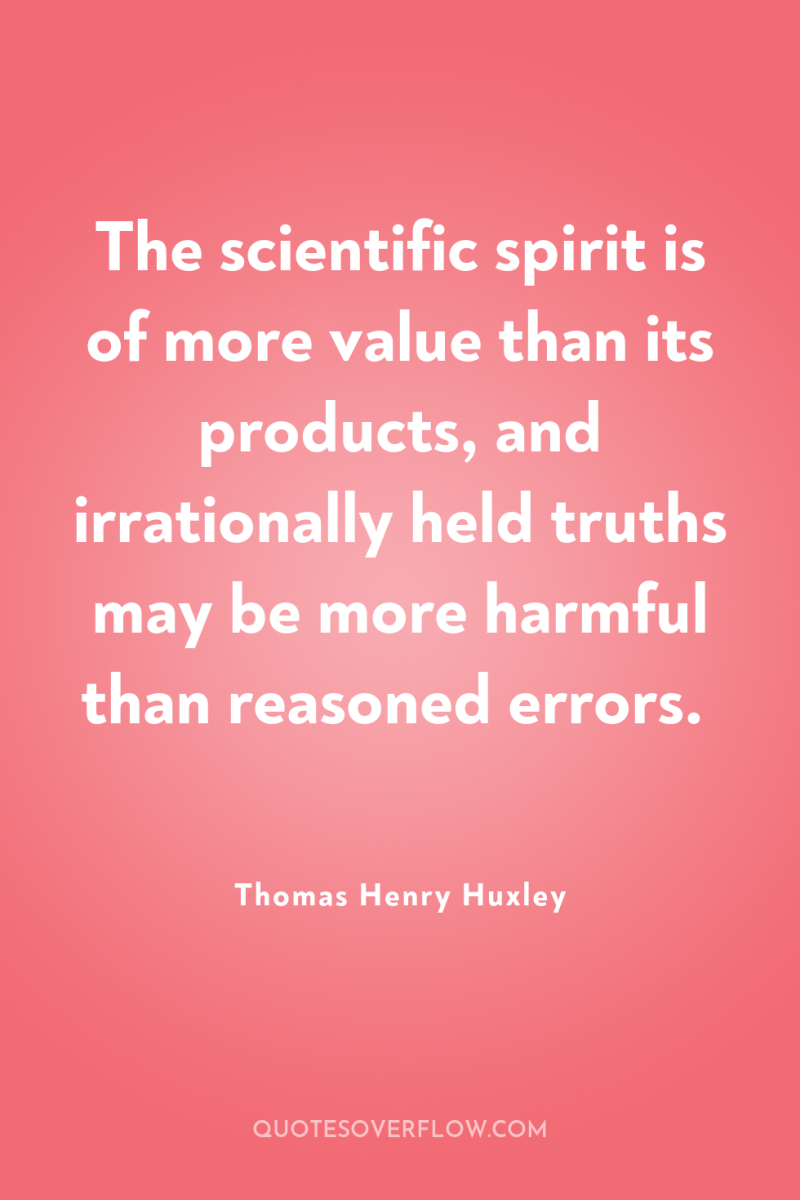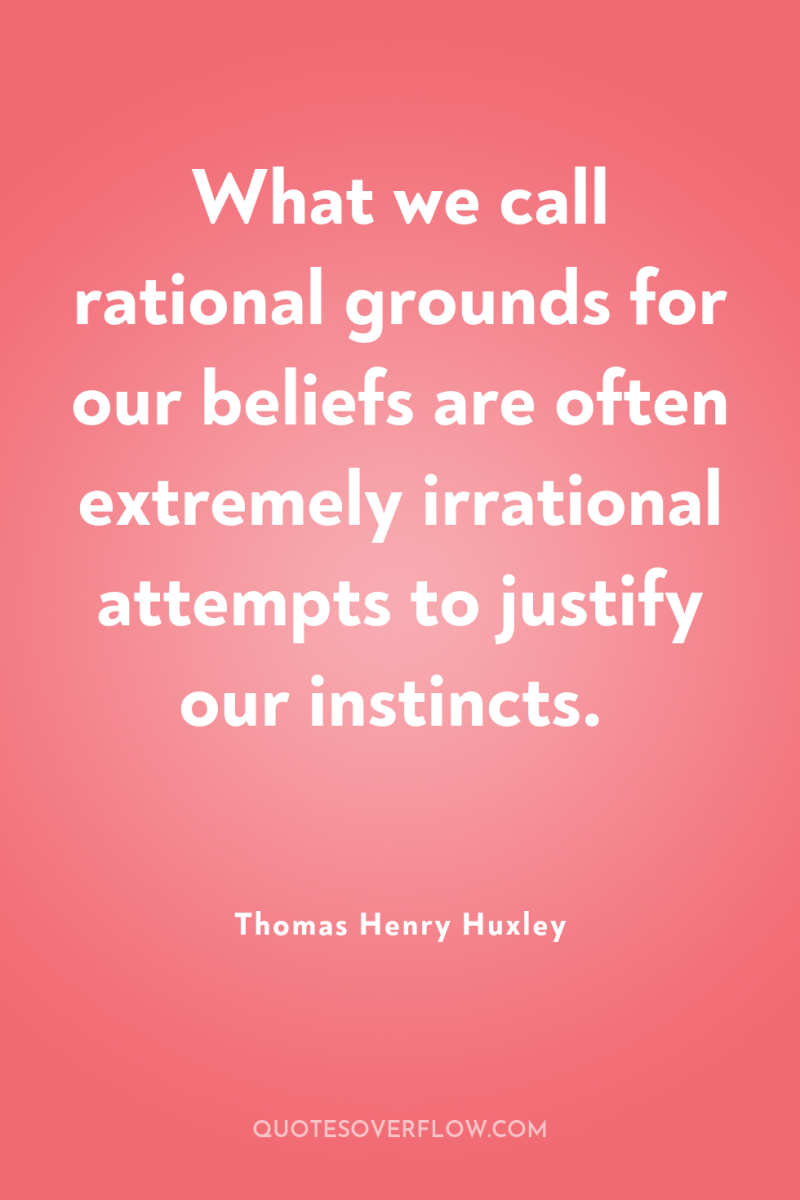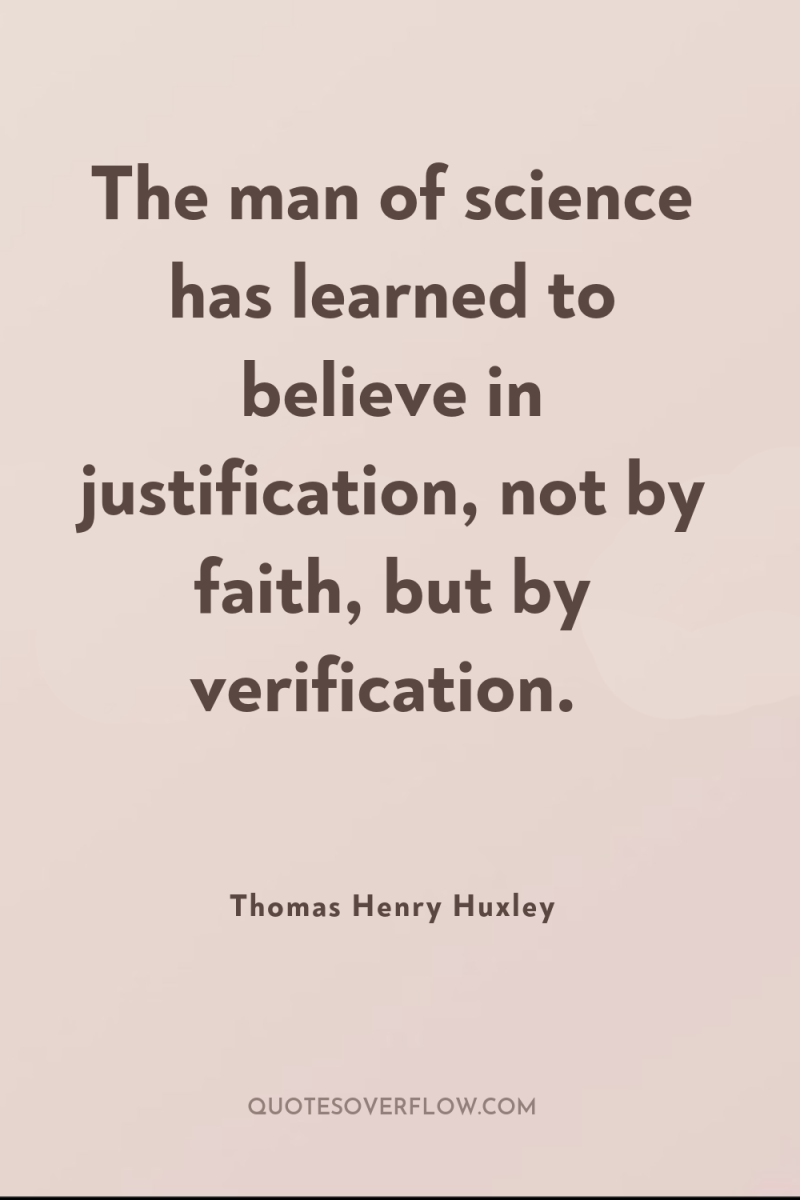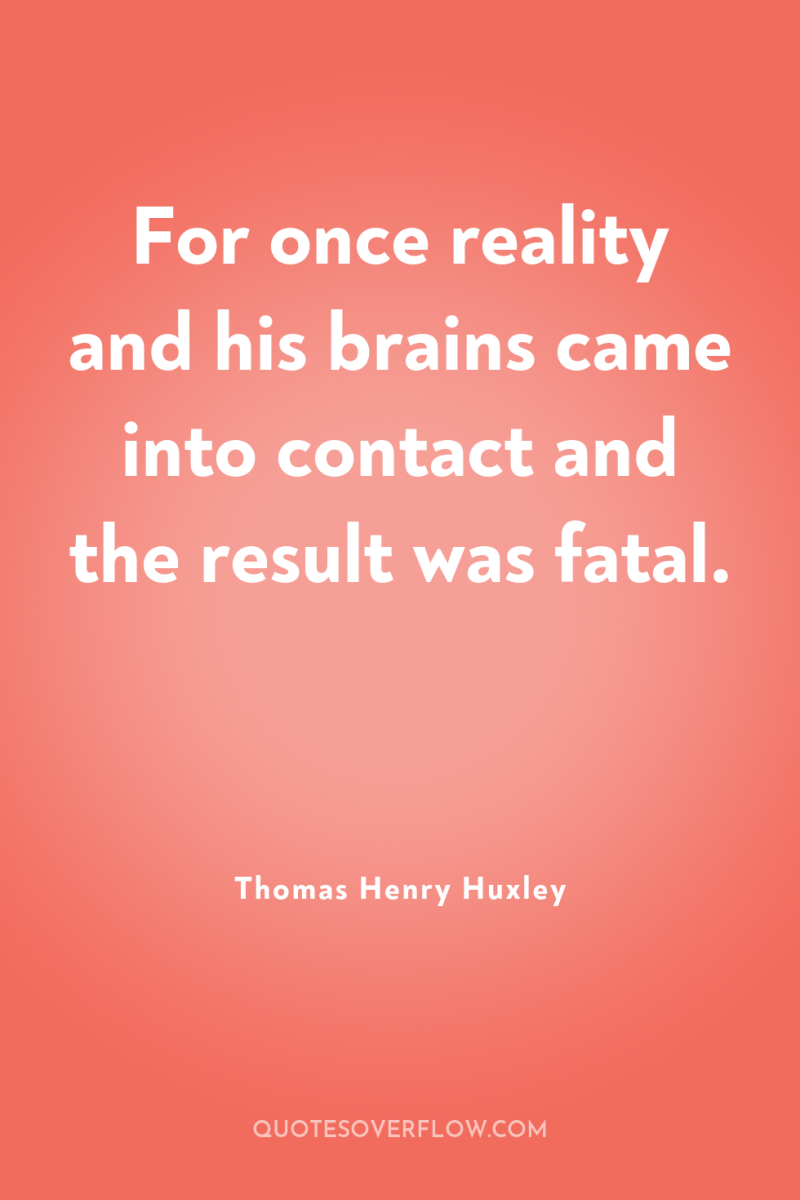1
Sit down before fact as a little child, be prepared to give up every preconceived notion, follow humbly wherever and to whatever abysses nature leads, or you shall learn nothing. I have only begun to learn content and peace of mind since I have resolved at all risks to do this.Thomas Henry Huxley

2
The scientific spirit is of more value than its products, and irrationally held truths may be more harmful than reasoned errors.Thomas Henry Huxley

3
What we call rational grounds for our beliefs are often extremely irrational attempts to justify our instincts.Thomas Henry Huxley
4
I am too much of a skeptic to deny the possibility of anything.Thomas Henry Huxley
5
From the dawn of exact knowledge to the present day, observation, experiment, and speculation have gone hand in hand; and, whenever science has halted or strayed from the right path, it has been, either because its votaries have been content with mere unverified or unverifiable speculation (and this is the commonest case, because observation and experiment are hard work, while speculation is amusing); or it has been, because the accumulation of details of observation has for a time excluded speculation.Thomas Henry Huxley
6
Perhaps the most valuable result of all education is the ability to make yourself do the thing you have to do, when it ought to be done, whether you like it or not. It is the first lesson that ought to be learned and however early a man's training begins, it is probably the last lesson that he learns thoroughly.Thomas Henry Huxley
7
Extinguished theologians lie about the cradle of every science as the strangled snakes beside that of Hercules; and history records that whenever science and orthodoxy have been fairly opposed, the latter has been forced to retire from the lists, bleeding and crushed if not annihilated; scotched, if not slain.Thomas Henry Huxley

8
The man of science has learned to believe in justification, not by faith, but by verification.Thomas Henry Huxley
9
The science, the art, the jurisprudence, the chief political and social theories, of the modern world have grown out of Greece and Rome–not by favour of, but in the teeth of, the fundamental teachings of early Christianity, to which science, art, and any serious occupation with the things of this world were alike despicable.Thomas Henry Huxley
10
But anyone who is practically acquainted with scientific work is aware that those who refuse to go beyond fact, rarely get as far as fact; and anyone who has studied the history of science knows that almost every great step therein has been made by the 'anticipation of Nature, ' that is, by the invention of hypotheses, which, though verifiable, often had very little foundation to start with.Thomas Henry Huxley

11
For once reality and his brains came into contact and the result was fatal.Thomas Henry Huxley
12
Science is nothing but trained and organized common sense, differing from the latter only as a veteran may differ from a raw recruit: and its methods differ from those of common sense only as far as the guardsman's cut and thrust differ from the manner in which a savage wields his club.Thomas Henry Huxley
13
Try to learn something about everything and everything about something.Thomas Henry Huxley
14
With theology as a code of dogmas which are to be believed, or at any rate repeated, under penalty of present or future punishment, or as a storehouse of anaesthetics for those who find the pains of life too hard to bear, I have nothing to do; and, so far as it may be possible, I shall avoid the expression of any opinion as to the objective truth or falsehood of the systems of theological speculation of which I may find occasion to speak. From my present point of view, theology is regarded as a natural product of the operations of the human mind, under the conditions of its existence, just as any other branch of science, or the arts of architecture, or music, or painting are such products. Like them, theology has a history. Like them also, it is to be met with in certain simple and rudimentary forms; and these can be connected by a multitude of gradations, which exist or have existed, among people of various ages and races, with the most highly developed theologies of past and present times. .Thomas Henry Huxley
15
It is my conviction that, with the spread of true scientific culture, whatever may be the medium, historical, philological, philosophical, or physical, through which that culture is conveyed, and with its necessary concomitant, a constant elevation of the standard of veracity, the end of the evolution of theology will be like its beginning–it will cease to have any relation to ethics. I suppose that, so long as the human mind exists, it will not escape its deep-seated instinct to personify its intellectual conceptions. The science of the present day is as full of this particular form of intellectual shadow-worship as is the nescience of ignorant ages. The difference is that the philosopher who is worthy of the name knows that his personified hypotheses, such as law, and force, and ether, and the like, are merely useful symbols, while the ignorant and the careless take them for adequate expressions of reality. So, it may be, that the majority of mankind may find the practice of morality made easier by the use of theological symbols. And unless these are converted from symbols into idols, I do not see that science has anything to say to the practice, except to give an occasional warning of its dangers. But, when such symbols are dealt with as real existences, I think the highest duty which is laid upon men of science is to show that these dogmatic idols have no greater value than the fabrications of men's hands, the stocks and the stones, which they have replaced. .Thomas Henry Huxley
16
Wherever sufficiently numerous series of the remains of any given group, which has endured for a long space of time, are carefully examined, their morphological relations are never in discordance with the requirements of the doctrine of evolution, and often afford convincing evidence of it. At the same time, it has been shown that certain forms persist with very little change, from the oldest to the newest fossiliferous formations; and thus show that progressive development is a contingent, and not a necessary result, of the nature of living matter.Thomas Henry Huxley
17
The most obvious and the most distinctive features of the History of Civilisation, during the last fifty years, is the wonderful increase of industrial production by the application of machinery, the improvement of old technical processes and the invention of new ones, accompanied by an even more remarkable development of old and new means of locomotion and intercommunication. By this rapid and vast multiplication of the commodities and conveniences of existence, the general standard of comfort has been raised, the ravages of pestilence and famine have been checked, and the natural obstacles, which time and space offer to mutual intercourse, have been reduced in a manner, and to an extent, unknown to former ages. The diminution or removal of local ignorance and prejudice, the creation of common interests among the most widely separated peoples, and the strengthening of the forces of the organisation of the commonwealth against those of political or social anarchy, thus effected, have exerted an influence on the present and future fortunes of mankind the full significance of which may be divined, but cannot, as yet, be estimated at its full value.Thomas Henry Huxley
18
In fact a favourite problem of [John Tyndall] is– Given the molecular forces in a mutton chop, deduce Hamlet or Faust therefrom. He is confident that the Physics of the Future will solve this easily.Thomas Henry Huxley
19
It appears now to be universally admitted that, before the exile, the Israelites had no belief in rewards and punishments after death, nor in anything similar to the Christian heaven and hell; but our story proves that it would be an error to suppose that they did not believe in the continuance of individual existence after death by a ghostly simulacrum of life. Nay, I think it would be very hard to produce conclusive evidence that they disbelieved in immortality; for I am not aware that there is anything to show that they thought the existence of the souls of the dead in Sheol ever came to an end. But they do not seem to have conceived that the condition of the souls in Sheol was in any way affected by their conduct in life. If there was immortality, there was no state of retribution in their theology. Samuel expects Saul and his sons to come to him in Sheol.Thomas Henry Huxley
20
Those who are ignorant of Geology, find no difficulty in believing that the world was made as it is; and the shepherd, untutored in history, sees no reason to regard the green mounds which indicate the site of a Roman camp, as aught but part and parcel of the primeval hill-side.Thomas Henry Huxley
21
Agnosticism, in fact, is not a creed, but a method, the essence of which lies in the rigorous application of a single principle. That principle is of great antiquity; it is as old as Socrates; as old as the writer who said, 'Try all things, hold fast by that which is good'; it is the foundation of the Reformation, which simply illustrated the axiom that every man should be able to give a reason for the faith that is in him, it is the great principle of Descartes; it is the fundamental axiom of modern science. Positively the principle may be expressed: In matters of the intellect, follow your reason as far as it will take you, without regard to any other consideration. And negatively: In matters of the intellect, do not pretend that conclusions are certain which are not demonstrated or demonstrable. That I take to be the agnostic position, which if a man keep whole and undefiled, he shall not be ashamed to look the universe in the face, whatever the future may have in store for him. The results of the working out of the agnostic principle will vary according to individual knowledge and capacity, and according to the general condition of science. That which is unproved today may be proved, by the help of new discoveries, tomorrow. The only negative fixed points will be those negations which flow from the demonstrable limitation of our faculties. And the only obligation accepted is to have the mind always open to conviction. That it is wrong for a man to say he is certain of the objective truth of a proposition unless he can provide evidence which logically justifies that certainty. This is what agnosticism asserts and in my opinion, is all that is essential to agnosticism.Thomas Henry Huxley
22
When I reached intellectual maturity, and began to ask myself whether I was an atheist, a theist, or a pantheist; a materialist or an idealist; a Christian or a freethinker, I found that the more I learned and reflected, the less ready was the answer; until at last I came to the conclusion that I had neither art nor part with any of these denominations, except the last. The one thing in which most of these good people were agreed was the one thing in which I differed from them. They were quite sure that they had attained a certain 'gnosis'--had more or less successfully solved the problem of existence; while I was quite sure I had not, and had a pretty strong conviction that the problem was insoluble. And, with Hume and Kant on my side, I could not think myself presumptuous in holding fast by that opinion ..So I took thought, and invented what I conceived to be the appropriate title of 'agnostic'. It came into my head as suggestively antithetic to the 'gnostic' of Church history, who professed to know so much about the very things of which I was ignorant; and I took the earliest opportunity of parading it at our Society, to show that I, too, had a tail, like the other foxes.Thomas Henry Huxley
23
To a clear eye the smallest fact is a window through which the infinite may be seen.Thomas Henry Huxley
24
History warns us ... that it is the customary fate of new truths to begin as heresies and to end as superstitions.Thomas Henry Huxley
25
And those who will carefully study the so-called 'Mosaic code' contained in the books of Exodus, Leviticus, and Numbers, will see that, though Jahveh's prohibitions of certain forms of immorality are strict and sweeping, his wrath is quite as strongly kindled against infractions of ritual ordinances. Accidental homicide may go unpunished, and reparation may be made for wilful theft. On the other hand, Nadab and Abihu, who 'offered strange fire before Jahveh, which he had not commanded them, ' were swiftly devoured by Jahveh's fire; he who sacrificed anywhere except at the allotted place was to be 'cut off from his people'; so was he who ate blood; and the details of the upholstery of the Tabernacle, of the millinery of the priests' vestments, and of the cabinet work of the ark, can plead direct authority from Jahveh, no less than moral commands.Thomas Henry Huxley
26
If then the question is put to me whether I would rather have a miserable ape for a grandfather or a man highly endowed by nature and possessed of great means of influence and yet employs these faculties and that influence for the mere purpose of introducing ridicule into a grave scientific discussion, I unhesitatingly affirm my preference for the ape.Thomas Henry Huxley
27
The practice of that which is ethically best–what we call goodness or virtue–involves a course of conduct which, in all respects, is opposed to that which leads to success in the cosmic struggle for existence. In place of ruthless self-assertion it demands self-restraint; in place of thrusting aside, or treading down, all competitors, it requires that the individual shall not merely respect, but shall help his fellows.. It repudiates the gladiatorial theory of existence.. Laws and moral precepts are directed to the end of curbing the cosmic process. .Thomas Henry Huxley
28
The question of the position of man, as an animal, has given rise to much disputation, with the result of proving that there is no anatomical or developmental character by which he is more widely distinguished from the group of animals most nearly allied to him, than they are from one another.Thomas Henry Huxley
29
There can be no doubt that the existing Fauna and Flora is but the last term of a long series of equally numerous contemporary species, which have succeeded one another, by the slow and gradual substitution of species for species, in the vast interval of time which has elapsed between the deposition of the earliest fossiliferous strata and the present day.Thomas Henry Huxley
30
All organisms vary. It is in the highest degree improbable that any given variety should have exactly the same relations to surrounding conditions as the parent stock. In that case it is either better fitted (when the variation may be called useful), or worse fitted, to cope with them. If better, it will tend to supplant the parent stock; if worse, it will tend to be extinguished by the parent stock. If (as is hardly conceivable) the new variety is so perfectly adapted to the conditions that no improvement upon it is possible, –it will persist, because, though it does not cease to vary, the varieties will be inferior to itself. If, as is more probable, the new variety is by no means perfectly adapted to its conditions, but only fairly well adapted to them, it will persist, so long as none of the varieties which it throws off are better adapted than itself. On the other hand, as soon as it varies in a useful way, i.e. when the variation is such as to adapt it more perfectly to its conditions, the fresh variety will tend to supplant the former.Thomas Henry Huxley
31
The tendency to variation in living beings, which all admitted as a matter of fact; the selective influence of conditions, which no one could deny to be a matter of fact, when his attention was drawn to the evidence; and the occurrence of great geological changes which also was matter of fact; could be used as the only necessary postulates of a theory of the evolution of plants and animals which, even if not at once, competent to explain all the known facts of biological science, could not be shown to be inconsistent with any.Thomas Henry Huxley
32
The occurrence of successive forms of life upon our globe is an historical fact, which cannot be disputed; and the relation of these successive forms, as stages of evolution of the same type, is established in various cases.Thomas Henry Huxley
33
The facts of variability, of the struggle for existence, of adaptation to conditions, were notorious enough; but none of us had suspected that the road to the heart of the species problem lay through them, until Darwin and Wallace dispelled the darkness.Thomas Henry Huxley
34
The most considerable difference I note among men is not in their readiness to fall into error, but in their readiness to acknowledge these inevitable lapses.Thomas Henry Huxley
35
I do not think anyone can read the letters which passed between Clarke and [Anthony] Collins without admitting that Collins, who writes with wonderful Power and closeness of reasoning, has by far the best of the argument, so far as the possible materiality of the soul goes; and that in this battle the Goliath of Freethinking overcame the champion of what was considered orthodoxy.Thomas Henry Huxley
36
There are savages without God in any proper sense of the word, but none without ghosts.Thomas Henry Huxley
37
Elohim was, in logical terminology, the genus of which ghosts, Chemosh, Dagon, Baal, and Jahveh were species. The Israelite believed Jahveh to be immeasurably superior to all other kinds of Elohim. The inscription on the Moabite stone shows that King Mesa held Chemosh to be, as unquestionably, the superior of Jahveh.Thomas Henry Huxley
38
Can any one deny that the old Israelites conceived Jahveh not only in the image of a man, but in that of a changeable, irritable, and, occasionally, violent man?Thomas Henry Huxley
39
Let us understand, once for all, that the ethical progress of society depends, not on imitating the cosmic process, still less in running away from it, but in combating it.Thomas Henry Huxley
40
It is certain that the labors of these early workers in the field of natural knowledge were brought to a standstill by the decay and disruption of the Roman Empire, the consequent disorganisation of society, and the diversion of men's thoughts from sublunary matters to the problems of the supernatural world suggested by Christian dogma in the Middle Ages. And, notwithstanding sporadic attempts to recall men to the investigation of nature, here and there, it was not until the fifteenth and sixteenth centuries that physical science made a new start, founding itself, at first, altogether upon that which had been done by the Greeks. Indeed, it must be admitted that the men of the Renaissance, though standing on the shoulders of the old philosophers, were a long time before they saw as much as their forerunners had done.Thomas Henry Huxley
41
In order to get over the ethical difficulties presented by the naive naturalism of many parts of those Scriptures, in the divine authority of which he firmly believed, Philo borrowed from the Stoics (who had been in like straits in respect of Greek mythology), that great Excalibur which they had forged with infinite pains and skill–the method of allegorical interpretation. This mighty 'two-handed engine at the door' of the theologian is warranted to make a speedy end of any and every moral or intellectual difficulty, by showing that, taken allegorically or, as it is otherwise said, 'poetically' or, 'in a spiritual sense, ' the plainest words mean whatever a pious interpreter desires they should mean.Thomas Henry Huxley
42
Of moral purpose I see no trace in Nature. That is an article of exclusively human manufacture and very much to our credit.Thomas Henry Huxley
43
The most considerable difference I note among men is not in their readiness to fall into error but in their readiness to acknowledge these inevitable lapses.Thomas Henry Huxley
44
Act decidedly and take the consequences. No good is ever done by hesitation.Thomas Henry Huxley